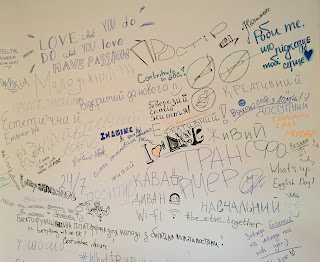During one of my presentations at a secondary school in Lviv I was asked the question, “What differences do you see between Ukrainians and Americans?” This question took me by surprise, but I realized I had been thinking about this unconsciously throughout my trip.
What are Ukrainian social values? How do citizens connect with their communities? What does the civic sector look like in Lviv? What causes are youth passionate about? Are the answers different in the United States? In the Chicago area? Do I even know those answers to begin with?
 |
| Karin presenting at a secondary school in Lviv. |
“I think we actually have more similarities than differences,” I stated. I spoke about how both Americans and Ukrainians are interested in the same goals - creating inclusive, positive, and innovative societies that best benefit their citizens. Perhaps this was an idealistic understanding of my time here and of my thoughts about America, but that is how I feel in the moment.
After this presentation I ate lunch with Olga, one of the program managers at my host organization, Society Initiatives Institute (ICI). She had heard my presentation and had her own thoughts about that question.
“We operate in these social activist circles, you and I. When we travel to other countries we meet with like-minded people, because we want to discuss social issues we are passionate about. But in every country there are people who do not share our values. People who are close-minded and don’t believe what we believe in.”
Her comments shifted my rosy-colored perception of Americans and Ukrainians more towards reality. It is true that each nation has a diverse population, of people who are liberal and conservative, young and old, tolerant and intolerant. However, I think that further supports my statement that we are more similar than different. We are countries full of individuals, who are just that, individuals. I think we forget that sometimes. That the world is full of individual people - not numbers, statistics, facts, or victims. People - with bodies, hearts, minds, and hope.
I had the opportunity to join the ICI team and volunteers for a team building retreat. About 20
 |
| The ICI team and volunteers share their personal asset maps. |
On my last day in Lviv, I spoke with attendees of the Lviv Model United Nations conference. Nearly 100 university students gathered from Israel, Kazakhstan, Lebanon, Slovakia, Poland, Russia, and Ukraine. Our conversation around global social entrepreneurship and corporate social responsibility brought up challenging and important questions.
How are corporations held accountable for the negative impact they might have on the environment? In what ways can private-public partnerships improve transportation options in urban centers? What are some best practices in the corporate social responsibility space?
I cannot claim to be an expert in this field, which I also explained to my audience. However, I can encourage this dialogue amongst passionate, young people and offer my ideas while encouraging them to share theirs.
 |
| Lviv Model United Nations conference |
I am so thankful to Allowance for Good, American Councils, Society Initiatives Institute, and WorldChicago for their support of this program and enhancing both my professional and personal growth. I look forward to continuing this bicontinental partnership in the months to come.































